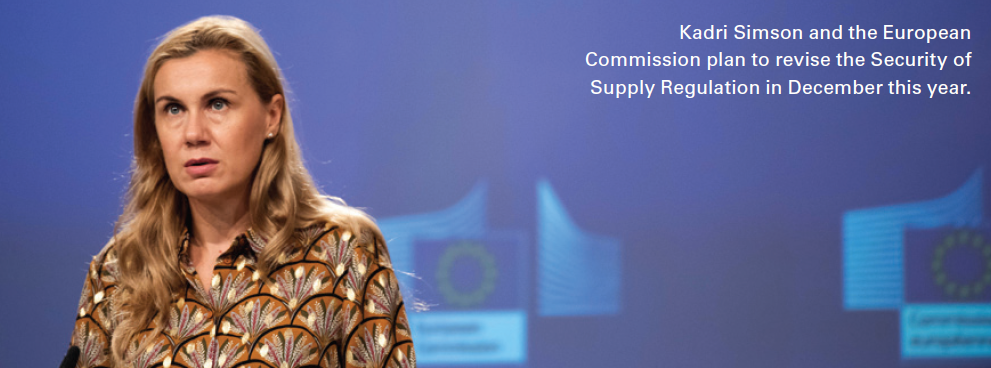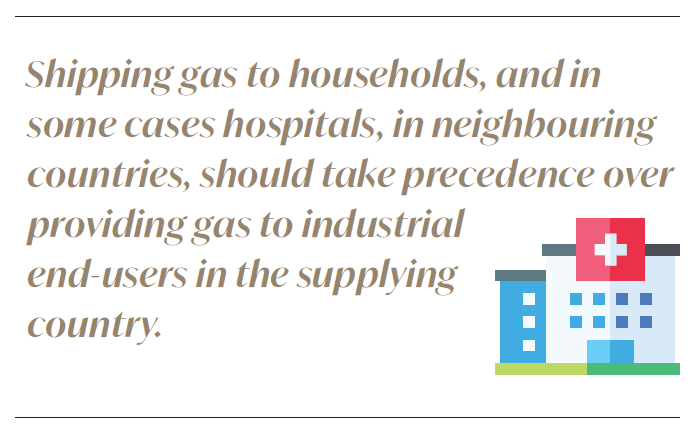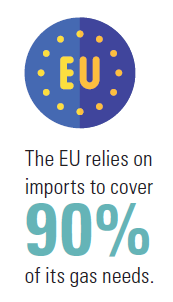Tight winter supply may put EU solidarity regulation to the test [Gas in Transition]
The “solidarity” principle under the EU’s Security of Supply Regulation – which obliges EU member states to share gas in crisis situations – may be put to the test for the first time this winter, should crisis situations arise from supply disruptions coinciding with cold spells and outages.
The Security of Supply Regulation 2017/1938 was adopted by the EU institutions in 2017 as part of the EU package and replaced the previous regulation from 2010. The new set of rules took a more regional approach to security of supply which differs from the national approach in the previous regulation. This means, for example, that EU Member states must collaborate to carry out risk assessments, preventive action plans and emergency plans at a regional level and update them every four years “unless circumstances warrant more frequent updates.”
Yet the most radical change was Article 13 which sets out obligations for sharing of gas in crisis situations – the so-called “solidarity principle”. In short, this means shipping gas to households, and in some cases hospitals, in neighbouring countries, should take precedence over providing gas to industrial end-users in the supplying country.
Article 13 says that if a member state has requested the solidarity measure to be activated, the regulator or transmission/distribution system operator (TSO/DSO) in another member state – which has a pipeline connection to that country – “shall as far as possible without creating unsafe situations” take the necessary measures to ensure that the gas supply to customers other than solidarity protected customers is reduced or does not continue to the extent necessary. Solidarity protected customers means households and in some cases healthcare, essential social care, emergency and security services. This curtailment should carry on for as long as the gas supply to solidarity protected customers in the requesting member state is needed.
 For the member state providing solidarity, this means gas supply to for example industries and power plants will be reduced. In exceptional circumstances, however, and upon a “duly reasoned request “by the relevant electricity or gas TSO to the national regulator, the gas supply may also continue to certain critical gas-fired power plants in the country providing solidarity “if the lack of gas supply to such plants would result in severe damage in the functioning of the electricity system or would hamper the production and/or transportation of gas.” This situation could arise, for example, if wind levels are low and gas is needed to ensure security of electricity supply as seen across Europe in recent weeks.
For the member state providing solidarity, this means gas supply to for example industries and power plants will be reduced. In exceptional circumstances, however, and upon a “duly reasoned request “by the relevant electricity or gas TSO to the national regulator, the gas supply may also continue to certain critical gas-fired power plants in the country providing solidarity “if the lack of gas supply to such plants would result in severe damage in the functioning of the electricity system or would hamper the production and/or transportation of gas.” This situation could arise, for example, if wind levels are low and gas is needed to ensure security of electricity supply as seen across Europe in recent weeks.
Another important point under Article 13 is that a member state shall also provide the solidarity measure to another member state to which it is connected via a third country unless flows on the relevant infrastructure are restricted. This would mean, for example, that Germany would be obliged to supply gas to Spain in a crisis situation via France, or vice versa. Another example would be Poland supplying “solidarity gas” to Hungary through Slovakia.
Last resort
The regulation stipulates that the solidarity clause shall only be activated as a last resort and shall apply only if the requesting member state has not been able to cover the deficit in gas supply to households and other solidarity protected customers despite trying all market-based measures and all measures provided in its emergency plan.
Yet against the backdrop of soaring gas prices, relatively low storage levels – European storage is about 78% full, while it is normally closer to 100% full at this time of year – and an expected tight supply margin this winter, the Security of Supply Regulation is looking more relevant than in previous years. It is not unthinkable that a perfect storm of cold spells, disruptions to supply, for example from Russia, nuclear power outages and low wind levels could trigger crisis situations as seen in 2006 and 2009. For example, Europe’s domestic production has been on the decline for years and the EU’s import dependency is very high, at around 90%. Competition for spot LNG cargoes from Asia may further deteriorate the supply situation.
At the same time, gas market interconnectivity is improving with more infrastructure such as cross-border interconnectors and LNG terminals being built, particularly in Eastern and South Eastern Europe. ENTSOG, the Brussels based agency which represents Europe’s gas TSOs, took note of this development in its Winter Outlook 2021/22 report published on October 12.
“South-Eastern Europe has significantly reduced its exposure to demand curtailment following the commissioning of new infrastructure,” the ENTSOG report said.
“The implementation of Turkstream, Trans Adriatic Pipeline and other investments in South-Eastern Europe mitigate any risk of demand curtailment in Greece, Bulgaria and North Macedonia.”
The report noted however that the Baltic States and Finland “could be exposed to demand curtailment in case of extreme temperatures combined with import route disruptions from Ukraine or Russia.”
It is worth noting that Europe’s gas markets have evolved in terms of liquidity, transparency and fair access since the events in 2006 and 2009 when Russian gas piped through the Ukraine did not reach end-users in Europe. Third party access to pipelines and storage facilities has improved with the implementation of the Third Energy Package and market transparency is also better with the implementation of the Regulation on Wholesale Energy Market Integrity and Transparency (REMIT). REMIT obliges energy companies to share critical information about outages on infrastructure and production assets. The EU network codes, which for example set out rules on cross-border capacity auctions and measures to prevent capacity hoarding on pipelines, have also made markets more efficient.
"We have a principle in Europe that we trust markets. So far, markets haven proven to work. The solidarity provision is a tool that hopefully never will be needed," Erik Rakhou, management consultant at Baringa Partners tells NGW.
However, unforeseen situations may occur this winter, be it for technical or political reasons, and this could make the solidarity clause relevant. As the regulation is untested, however, it remains to be seen how well it would work in practice during a chaotic emergency situation. To this end, there appears to be a lot of overlapping responsibilities between national regulators, TSOs and the EC as well as gas companies. This means communication, trust and clarity will be key for the regulation to work in practice.
The regulation says that, in the event of an emergency which may result in a call for assistance from the EU and its member states, the regulator of the requesting member state shall “without delay” notify the EC’s Emergency Response Coordination Centre (ERCC). The EC shall verify, as soon as possible, but in any case within five days of receiving the information, whether the declaration of an emergency is justified.
Compensation arrangements
One sticking point is that the member state receiving the “solidarity gas” is expected to compensate the exporting country financially, but it is up to the national governments and regulators to work out the amount of such payments in their emergency plans.
"If we run into a situation whereby markets do not work then the solidarity provision may need to apply. It could happen that industries will be asked to turn off gas to keep households warm,” says Rakhou.
“One question then is what is the value of the lost load? And what about the economic consequences for the industries that temporarily turn off operations? These values are likely to be determined differently across different regions," he says.
The regulation says the solidarity measure shall only apply if the receiving country has undertaken to pay “fair and prompt compensation” to the member state providing solidarity. In addition to the price of the gas, the compensation shall take into account “all other relevant and reasonable costs” incurred when providing solidarity.
Member states had until December 1, 2018 to adopt the necessary measures, in particular the technical, legal and financial arrangements. However, there is little transparency with regards to regional arrangements.
The EC said this week it plans to revise the Security of Supply regulation in December this year to ensure better use and functioning of gas storage in Europe, for example by looking at auction-based support mechanisms. It did not give further details at this stage. The EC also said it would "explore the potential benefits" of joint purchasing of gas stocks between member states on a voluntary basis. These reviews are part of a “toolbox” of measures to help alleviate increasing energy prices for industries and households in Europe.
Joint purchasing of gas has been discussed at EU-level before. It was proposed by then Polish prime minister Donald Tusk in 2014, but this did not lead to a legislative proposal.



